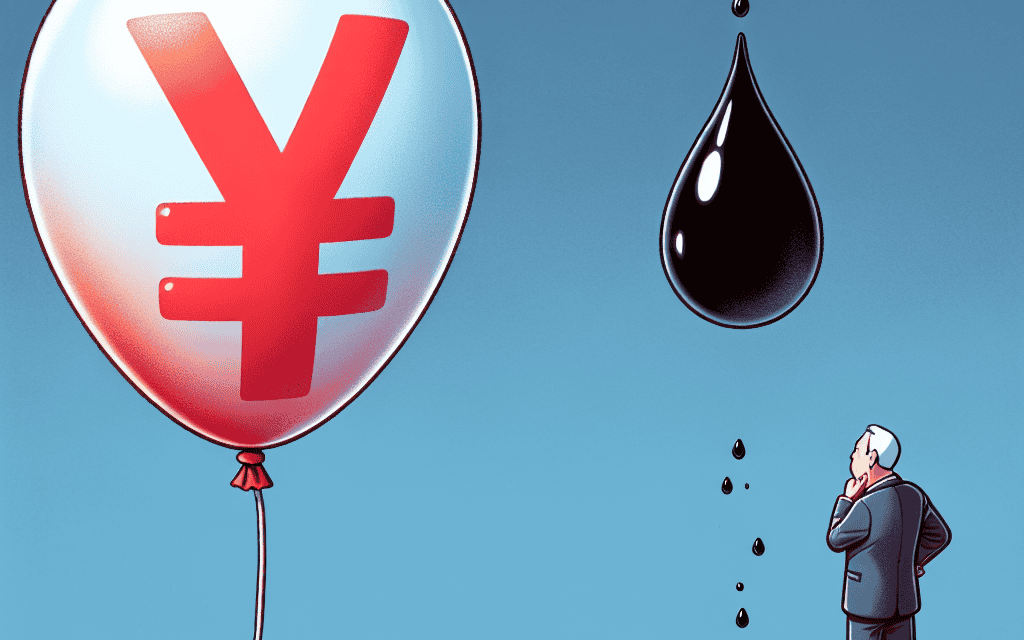“Market Shifts: Yen Dips Post-Election, Oil Prices Tumble”
Introduction
Following the recent Japanese election, the yen has experienced a notable decline, reflecting market reactions to the political landscape and its potential economic implications. Investors are closely monitoring the currency’s performance as it navigates the post-election environment. Concurrently, global oil prices have seen a downturn, influenced by a combination of factors including shifts in supply dynamics and demand forecasts. This market overview delves into the interconnected movements of the yen and oil prices, providing insights into the broader economic context and investor sentiment shaping these trends.
Impact Of Japanese Election Results On The Yen
The recent Japanese election has had a notable impact on the financial markets, particularly influencing the value of the yen. As the election results unfolded, the yen experienced a decline, reflecting investor sentiment and market reactions to the political landscape in Japan. This depreciation of the yen can be attributed to several factors, including the anticipated economic policies of the newly elected government and the broader implications for Japan’s fiscal and monetary strategies.
In the wake of the election, market participants have been closely analyzing the potential shifts in economic policy that the new administration might implement. Historically, changes in government can lead to uncertainty in financial markets, as investors reassess their expectations for future economic performance. In this case, the yen’s decline suggests that investors may be anticipating policies that could lead to a more accommodative monetary stance or increased fiscal spending, both of which could exert downward pressure on the currency.
Moreover, the yen’s movement is not occurring in isolation. It is essential to consider the broader context of global financial markets, where other factors are also at play. For instance, the recent drop in oil prices has added another layer of complexity to the market dynamics. Lower oil prices can have mixed effects on the Japanese economy, which is heavily reliant on energy imports. On one hand, reduced oil prices can lower import costs and improve trade balances, potentially supporting economic growth. On the other hand, they can also signal weaker global demand, which might dampen Japan’s export-driven economy.
The interplay between the yen’s decline and oil price fluctuations highlights the interconnectedness of global markets. Investors are not only reacting to domestic political changes but are also considering international economic conditions. This interconnectedness underscores the importance of a comprehensive approach to market analysis, where multiple variables must be taken into account to understand the full picture.
Furthermore, the yen’s depreciation has implications for various sectors within Japan’s economy. A weaker yen can benefit exporters by making Japanese goods more competitive abroad, potentially boosting sales and profits for companies in industries such as automotive and electronics. However, it can also increase the cost of imports, which may lead to higher prices for consumers and businesses reliant on foreign goods and materials.
In conclusion, the decline of the yen following the Japanese election results is a multifaceted issue that reflects both domestic political changes and broader global economic trends. As investors and analysts continue to assess the potential impacts of the new government’s policies, the yen’s trajectory will likely remain a focal point in financial markets. Additionally, the concurrent drop in oil prices adds another layer of complexity, influencing both the Japanese economy and global market sentiment. As these developments unfold, market participants will need to remain vigilant, considering both domestic and international factors to navigate the evolving financial landscape effectively.
Factors Contributing To The Yen’s Decline
Following the recent Japanese election, the yen has experienced a notable decline, a development that has captured the attention of global financial markets. This depreciation can be attributed to a confluence of factors, each playing a significant role in shaping the currency’s trajectory. Understanding these elements is crucial for investors and policymakers alike as they navigate the complexities of the international economic landscape.
Firstly, the outcome of the Japanese election has introduced a degree of political uncertainty, which often exerts downward pressure on a nation’s currency. The election results have led to speculation about potential shifts in economic policy, particularly concerning fiscal stimulus and monetary policy. Investors, wary of the unknown, tend to seek safer assets, thereby reducing demand for the yen. This political backdrop, coupled with the anticipation of policy changes, has contributed to the yen’s recent weakness.
Moreover, the yen’s decline is also influenced by the broader context of global monetary policy. As major economies, particularly the United States, continue to tighten their monetary policies, the interest rate differential between Japan and other countries widens. The Bank of Japan’s commitment to maintaining ultra-loose monetary policy, including negative interest rates, contrasts sharply with the Federal Reserve’s hawkish stance. This divergence makes the yen less attractive to investors seeking higher yields, further exacerbating its depreciation.
In addition to these monetary policy dynamics, Japan’s economic fundamentals play a crucial role in the yen’s performance. Despite some positive indicators, such as improvements in export figures, Japan’s economy faces structural challenges, including an aging population and stagnant wage growth. These issues hinder domestic consumption and economic expansion, limiting the yen’s potential for appreciation. Furthermore, Japan’s reliance on energy imports makes it vulnerable to fluctuations in global oil prices, which have recently seen a decline. While lower oil prices can reduce import costs and benefit the trade balance, they also reflect broader concerns about global economic growth, which can weigh on the yen.
The yen’s decline is not occurring in isolation but is part of a larger narrative involving other currencies and commodities. For instance, the recent drop in oil prices has implications for currency markets worldwide. As oil prices fall, commodity-linked currencies, such as the Canadian dollar and the Norwegian krone, often experience volatility. This interconnectedness highlights the complexity of global financial markets, where movements in one asset class can reverberate across others.
In conclusion, the yen’s recent decline following the Japanese election is the result of a multifaceted interplay of political uncertainty, divergent monetary policies, and underlying economic fundamentals. As investors and analysts assess these factors, they must also consider the broader global context, including shifts in oil prices and their impact on currency markets. By understanding these dynamics, stakeholders can better anticipate future trends and make informed decisions in an ever-evolving economic environment. As the situation continues to unfold, close monitoring of both domestic and international developments will be essential in predicting the yen’s trajectory and its implications for the global economy.
How Oil Prices Influence Global Markets
The recent decline in oil prices has once again highlighted the intricate web of interdependencies that characterize global markets. As oil remains a critical commodity, its price fluctuations can have far-reaching implications across various sectors and economies. Understanding how oil prices influence global markets requires an examination of the multifaceted roles that oil plays in the global economy, from being a fundamental energy source to its impact on trade balances and inflation rates.
Oil is a primary energy source for industries and households worldwide, making its price a significant determinant of production costs. When oil prices drop, as observed recently, it often leads to reduced costs for businesses that rely heavily on energy, such as manufacturing and transportation. This reduction in costs can enhance profit margins, potentially leading to increased investment and expansion activities. Consequently, stock markets may respond positively to lower oil prices, as investors anticipate improved corporate earnings. However, the relationship is not always straightforward, as other factors, such as geopolitical tensions or economic policies, can also influence market sentiment.
Moreover, oil prices have a direct impact on inflation rates. Lower oil prices generally lead to decreased transportation and production costs, which can translate into lower prices for goods and services. This deflationary effect can be beneficial for consumers, as it increases their purchasing power. However, central banks closely monitor these trends, as prolonged periods of low inflation or deflation can pose challenges for monetary policy. In such scenarios, central banks may adjust interest rates to stimulate economic activity, which in turn can affect currency values and international trade dynamics.
The influence of oil prices extends beyond domestic markets, affecting global trade balances and economic relationships. Countries that are net importers of oil, such as Japan, benefit from lower oil prices as their import bills decrease, improving their trade balances. Conversely, oil-exporting nations may experience reduced revenues, which can lead to budgetary constraints and economic slowdowns. This shift in trade balances can alter currency valuations, as seen with the recent decline of the yen following the Japanese election. A weaker yen can make Japanese exports more competitive, potentially boosting the country’s economic growth, but it also raises the cost of imports, including oil.
Furthermore, the interconnectedness of global markets means that changes in oil prices can influence investor behavior and capital flows. Lower oil prices may lead investors to seek opportunities in emerging markets that are net importers of oil, anticipating economic growth driven by reduced energy costs. Conversely, oil-exporting countries may experience capital outflows as investors reassess the risk-reward balance in light of declining oil revenues. These shifts in capital flows can impact exchange rates and financial stability in both importing and exporting nations.
In conclusion, the recent drop in oil prices underscores the complex and multifaceted ways in which this vital commodity influences global markets. From affecting production costs and inflation rates to altering trade balances and capital flows, oil prices play a pivotal role in shaping economic landscapes. As such, market participants and policymakers must remain vigilant, continuously assessing the broader implications of oil price movements to navigate the ever-evolving global economic environment effectively.
Correlation Between Yen Decline And Oil Price Drop

In the wake of the recent Japanese election, the financial markets have witnessed a notable decline in the value of the yen, which has coincided with a drop in global oil prices. This simultaneous movement in two seemingly disparate markets has prompted analysts to explore the potential correlation between the yen’s depreciation and the decrease in oil prices. Understanding this relationship requires a closer examination of the underlying economic factors and market dynamics at play.
To begin with, the yen’s decline can be attributed to the political uncertainty that often follows an election. Investors tend to react cautiously to changes in government, especially when the election results suggest potential shifts in economic policy. In Japan’s case, the election outcome has raised questions about the future direction of monetary policy, leading to a sell-off in the yen as investors seek safer assets. This depreciation of the yen makes Japanese exports more competitive on the global stage, potentially boosting the country’s trade balance. However, it also raises the cost of imports, including oil, which Japan heavily relies on due to its limited domestic energy resources.
Meanwhile, the drop in oil prices can be linked to a variety of global factors. One significant influence is the ongoing concerns about global economic growth, which have been exacerbated by geopolitical tensions and trade disputes. These concerns have led to a decrease in demand for oil, as industries anticipate slower growth and reduced consumption. Additionally, increased oil production in countries like the United States has contributed to an oversupply in the market, further driving down prices. The interplay between supply and demand is a fundamental aspect of the oil market, and any shifts can have immediate effects on pricing.
The correlation between the yen’s decline and the drop in oil prices can be partially explained by the interconnectedness of global financial markets. As the yen weakens, Japanese importers face higher costs for oil, which could lead to reduced demand from one of the world’s largest oil-importing nations. This decrease in demand can exert downward pressure on global oil prices. Conversely, lower oil prices can impact Japan’s trade balance by reducing the cost of imports, potentially offsetting some of the negative effects of a weaker yen.
Furthermore, investor sentiment plays a crucial role in both currency and commodity markets. The yen is often considered a safe-haven currency, attracting investors during times of global uncertainty. However, when confidence in Japan’s economic stability is shaken, as it might be following an election, investors may move their capital to other assets, contributing to the yen’s decline. Similarly, oil prices are sensitive to market sentiment, with traders reacting to news and forecasts that could affect future supply and demand.
In conclusion, while the decline in the yen and the drop in oil prices may appear coincidental, they are influenced by a complex web of economic factors and market perceptions. The political landscape in Japan, global economic conditions, and investor behavior all contribute to the movements observed in these markets. As analysts continue to monitor these developments, understanding the correlation between currency fluctuations and commodity prices remains essential for making informed investment decisions. This interconnectedness underscores the importance of a comprehensive approach to analyzing financial markets, where seemingly unrelated events can have far-reaching implications.
Market Reactions To Political Changes In Japan
Following the recent Japanese election, the financial markets have responded with notable shifts, particularly in the currency and commodities sectors. The Japanese yen has experienced a decline, a movement that has captured the attention of investors and analysts alike. This depreciation of the yen can be attributed to the political changes that have emerged from the election results, which have introduced a degree of uncertainty regarding Japan’s economic policies. As investors digest the implications of the new political landscape, the yen’s performance is being closely monitored, reflecting broader market sentiments and expectations.
The election outcome has raised questions about the future direction of Japan’s monetary and fiscal policies. With the new government potentially altering the course of economic strategy, market participants are recalibrating their positions. The yen’s decline is indicative of a cautious approach by investors who are seeking clarity on how the new administration will address key economic challenges, such as inflation control and economic growth stimulation. This uncertainty has led to a shift in currency trading patterns, with the yen losing ground against major currencies like the US dollar and the euro.
In tandem with the yen’s decline, global oil prices have also seen a downward trend. This drop in oil prices is not solely linked to the political changes in Japan but is part of a broader market reaction to various global factors. However, the interconnectedness of global markets means that shifts in one region can have ripple effects elsewhere. The decrease in oil prices can be partially attributed to concerns over global economic growth, which have been exacerbated by the political developments in Japan. As one of the world’s largest economies, Japan’s political stability and economic policies have significant implications for global trade and investment flows.
Moreover, the decline in oil prices is also influenced by supply-side factors, including production levels from major oil-producing countries and inventory data. The recent election in Japan has added another layer of complexity to the already intricate dynamics of the oil market. Investors are now weighing the potential impact of Japan’s new government on energy policies, which could affect demand for oil and other energy resources. This has led to increased volatility in oil trading, as market participants adjust their strategies in response to the evolving political and economic landscape.
As the markets continue to react to the political changes in Japan, it is essential for investors to remain vigilant and informed. The interplay between currency fluctuations and commodity prices underscores the importance of understanding the broader economic context. While the yen’s decline and the drop in oil prices may present challenges, they also offer opportunities for those who can navigate the complexities of the market effectively. By staying attuned to policy announcements and economic indicators, investors can better position themselves to capitalize on potential market movements.
In conclusion, the recent Japanese election has had a significant impact on financial markets, with the yen’s decline and the drop in oil prices serving as key indicators of market sentiment. As the new government settles into power, the focus will be on how its policies will shape Japan’s economic future and influence global markets. Investors must remain adaptable and informed, as the evolving political landscape continues to drive market reactions and shape investment strategies.
Economic Implications Of A Weaker Yen
The recent decline of the Japanese yen following the country’s election has sparked significant discussions among economists and market analysts, particularly concerning the broader economic implications of a weaker yen. This currency depreciation, coupled with a simultaneous drop in oil prices, presents a complex landscape for both domestic and international markets. To understand the economic implications of a weaker yen, it is essential to consider the multifaceted effects on trade, inflation, and monetary policy.
Firstly, a weaker yen can have profound implications for Japan’s export-driven economy. As the yen depreciates, Japanese goods become more competitively priced in international markets, potentially boosting exports. This could lead to increased revenues for Japanese companies operating abroad, thereby enhancing their profitability. Consequently, this might stimulate economic growth within Japan, as higher export earnings can translate into increased investment and job creation. However, it is crucial to note that while exporters may benefit, importers face higher costs for foreign goods and raw materials, which could offset some of the gains from increased exports.
Moreover, the depreciation of the yen can influence inflationary pressures within Japan. A weaker currency makes imports more expensive, which can lead to higher consumer prices domestically. This imported inflation can be a double-edged sword for the Japanese economy. On one hand, it can help the Bank of Japan in its efforts to achieve its inflation target, which has been persistently elusive in recent years. On the other hand, if inflation rises too quickly, it could erode consumer purchasing power and dampen domestic demand, posing a challenge for policymakers.
In addition to these domestic considerations, the weaker yen has implications for Japan’s monetary policy. The Bank of Japan may face increased pressure to adjust its policy stance in response to currency movements. If the yen continues to weaken significantly, the central bank might consider tightening monetary policy to stabilize the currency and prevent excessive inflation. However, such a move could be risky, as it might stifle economic growth and counteract the benefits of a weaker yen for exporters. Therefore, the Bank of Japan must carefully balance these competing priorities to maintain economic stability.
Furthermore, the decline in oil prices adds another layer of complexity to the economic implications of a weaker yen. Lower oil prices can provide relief to Japanese consumers and businesses by reducing energy costs, which could offset some of the inflationary pressures from a weaker currency. However, for oil-exporting countries, reduced revenues from oil sales could lead to decreased demand for Japanese exports, potentially dampening the positive effects of a weaker yen on Japan’s trade balance.
In conclusion, the economic implications of a weaker yen are multifaceted and require careful consideration by policymakers and market participants. While a depreciated yen can boost exports and help achieve inflation targets, it also poses challenges in terms of higher import costs and potential inflationary pressures. The interplay between currency movements and oil prices further complicates the economic landscape, necessitating a nuanced approach to monetary and fiscal policy. As Japan navigates these challenges, the decisions made by its policymakers will have significant ramifications not only for the domestic economy but also for global financial markets.
Future Projections For Yen And Oil Prices
Following the recent Japanese election, the yen has experienced a notable decline, prompting investors and analysts to reassess the currency’s future trajectory. This depreciation can be attributed to a combination of political uncertainty and economic policy expectations. As the new government settles in, market participants are keenly observing any shifts in fiscal and monetary policies that could influence the yen’s value. Historically, political transitions in Japan have often led to fluctuations in the currency market, as investors adjust their positions based on anticipated policy changes. In this context, the yen’s recent decline is not entirely unexpected, but it does raise questions about its future stability.
In parallel, global oil prices have also seen a downturn, influenced by a myriad of factors including geopolitical tensions, supply chain disruptions, and fluctuating demand patterns. The interplay between these elements creates a complex landscape for predicting future oil prices. Analysts are particularly focused on the actions of major oil-producing nations and their impact on global supply levels. OPEC’s production decisions, for instance, remain a critical factor in determining the direction of oil prices. Additionally, the ongoing transition towards renewable energy sources adds another layer of complexity, as it gradually reshapes the demand dynamics for fossil fuels.
Looking ahead, the future projections for the yen and oil prices are intertwined with broader economic trends and geopolitical developments. For the yen, much will depend on the new Japanese government’s ability to implement effective economic policies that can stimulate growth while maintaining fiscal discipline. The Bank of Japan’s monetary policy stance will also play a crucial role, particularly in terms of interest rate adjustments and quantitative easing measures. Should the central bank opt for a more accommodative approach, the yen could face further downward pressure. Conversely, a shift towards tightening could bolster the currency, provided it aligns with positive economic indicators.
In the case of oil prices, the outlook is equally contingent on a range of variables. The global economic recovery from the pandemic remains a pivotal factor, as it directly influences energy consumption patterns. A robust recovery could drive up demand for oil, thereby supporting higher prices. However, any resurgence of COVID-19 or other disruptive events could dampen demand and exert downward pressure on prices. Furthermore, the pace of technological advancements in renewable energy and the implementation of environmental policies will significantly impact the long-term demand for oil. As countries strive to meet their climate goals, the transition away from fossil fuels could accelerate, potentially leading to a structural decline in oil prices over time.
In conclusion, the future projections for the yen and oil prices are subject to a complex interplay of domestic and international factors. For investors and policymakers, staying attuned to these dynamics is essential for making informed decisions. While the current trends suggest potential challenges for both the yen and oil prices, opportunities may also arise from strategic policy interventions and market adjustments. As such, continuous monitoring and analysis will be crucial in navigating the evolving landscape of currency and commodity markets.
Q&A
1. **Question:** What was the immediate impact on the Japanese yen following the Japanese election?
– **Answer:** The Japanese yen declined in value following the Japanese election.
2. **Question:** How did the Japanese election results influence investor sentiment?
– **Answer:** The election results led to uncertainty or concerns among investors, contributing to the yen’s decline.
3. **Question:** What was the trend in oil prices during this market overview?
– **Answer:** Oil prices experienced a drop during this period.
4. **Question:** What factors contributed to the decline in oil prices?
– **Answer:** Factors such as increased supply, decreased demand, or geopolitical developments could have contributed to the decline in oil prices.
5. **Question:** How did the decline in the yen affect Japanese exports?
– **Answer:** A weaker yen generally makes Japanese exports more competitive abroad, potentially boosting export volumes.
6. **Question:** What was the broader impact on Asian markets due to the yen’s decline and oil price drop?
– **Answer:** The broader impact on Asian markets could include increased volatility and mixed performance, with some sectors benefiting and others facing challenges.
7. **Question:** How might central banks respond to the currency and commodity market changes observed?
– **Answer:** Central banks might consider adjusting monetary policy, such as interest rates or currency interventions, to stabilize their economies in response to these changes.
Conclusion
The recent decline in the Japanese yen following the country’s election, coupled with a drop in oil prices, highlights the complex interplay of political and economic factors influencing global markets. The yen’s depreciation may reflect investor uncertainty or expectations of continued monetary easing by the Bank of Japan, while the fall in oil prices could be attributed to concerns over global demand or increased supply. Together, these developments underscore the volatility and interconnectedness of financial markets, where political outcomes and commodity price shifts can have significant and immediate impacts on currency valuations and broader economic sentiment.





